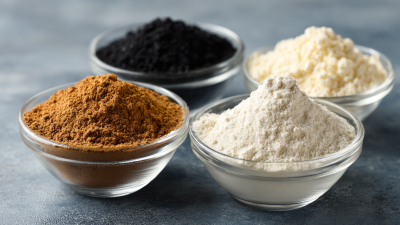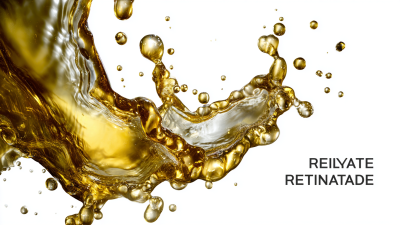Natural Vitamin E has gained recognition in the health and wellness industry for its powerful antioxidant properties and potential health benefits. According to a report by the National Institutes of Health, Vitamin E plays a crucial role in immune function, skin health, and cellular protection, making it a staple in dietary supplements and skincare products. As the demand for natural ingredients rises, consumers are increasingly seeking products that contain genuine Natural Vitamin E, free from synthetic alternatives that may undermine efficacy. In fact, a market analysis from Grand View Research indicates a growing trend towards natural vitamins, with a projected growth rate of over 8% annually in the vitamin and supplement sector through 2025. This blog will provide an essential checklist to help consumers ensure they select high-quality Natural Vitamin E products, leveraging both scientific evidence and industry insights for informed purchasing decisions.

 Vitamin E is a critical nutrient known for its antioxidant properties and potential health benefits. However, not all vitamin E supplements are created equal. The primary distinction lies between natural and synthetic variants.
Natural vitamin E, often labeled as d-alpha-tocopherol, is derived from plant sources and is more bioavailable, meaning that the body absorbs and uses it more effectively. This form typically comes with a host of other beneficial compounds, known as tocopherols and tocotrienols, which work synergistically to enhance its health effects.
Vitamin E is a critical nutrient known for its antioxidant properties and potential health benefits. However, not all vitamin E supplements are created equal. The primary distinction lies between natural and synthetic variants.
Natural vitamin E, often labeled as d-alpha-tocopherol, is derived from plant sources and is more bioavailable, meaning that the body absorbs and uses it more effectively. This form typically comes with a host of other beneficial compounds, known as tocopherols and tocotrienols, which work synergistically to enhance its health effects.
In contrast, synthetic vitamin E is usually produced in a laboratory and comes in the form of dl-alpha-tocopherol. While it may appear similar in chemical composition, studies suggest that the synthetic version is less effective at delivering the same health benefits as its natural counterpart.
Additionally, some consumers may not realize that synthetic variants can contain certain additives or preservatives that could compromise their overall quality. Educating yourself on these differences can ensure you make informed choices, allowing you to reap the full benefits of this essential vitamin with every purchase.
Vitamin E has gained significant attention for its powerful antioxidant properties, which play a crucial role in promoting skin health. As a natural vitamin, it helps in neutralizing free radicals, thereby reducing oxidative stress that can lead to inflammation and skin aging. Studies indicate that Vitamin E can enhance the skin’s barrier function, improve moisture retention, and potentially alleviate symptoms related to inflammatory skin conditions. Incorporating Vitamin E into your skincare routine or diet can lead to visible improvements in skin texture and overall health.

The market for natural antioxidants like Vitamin E is expanding rapidly, driven by a growing awareness of their health benefits. In particular, the global demand for Vitamin E is being fueled by its applications across various sectors, including pharmaceuticals, cosmetics, and food products. As consumers increasingly seek natural alternatives to synthetic ingredients, Vitamin E continues to dominate the market alongside other powerful antioxidants such as Vitamin C and carotenoids. With an anticipated growth trajectory, investing in quality Vitamin E products may not only enhance personal health but also align with broader health and wellness trends in society.
When it comes to choosing a high-quality natural vitamin E supplement, understanding how to read labels is crucial. The first thing to look for is the form of vitamin E—specifically, you should check for “d-alpha-tocopherol,” which is the natural form. Synthetic variants, labeled as “dl-alpha-tocopherol,” often lack the same efficacy and benefits. Additionally, the presence of mixed tocopherols and tocotrienols is a positive sign, as these compounds work synergistically to enhance the antioxidant properties of vitamin E.
Furthermore, pay attention to the purity standards indicated on the label. Look for supplements that are third-party tested for contaminants and label accuracy. Certifications from reputable organizations can also provide assurance of quality. Assessing the sources of the vitamin E is essential; ideally, it should come from whole food sources or natural extraction methods to ensure you are getting a product free from harmful additives. With this knowledge, you can make informed choices and fully harness the benefits of natural vitamin E in your health regimen.
When choosing vitamin E supplements, it's essential to recognize certified organic sources to ensure you’re getting the highest quality product. Look for labels that clearly state “certified organic” from reputable certifying bodies. This certification guarantees that the vitamin E was sourced from non-GMO plants and cultivated without the use of harmful pesticides or synthetic fertilizers.
Tips: Always check the ingredient list; a high-quality vitamin E supplement should primarily contain tocopherols or tocotrienols derived from natural sources like sunflower or safflower oil. Avoid products with artificial additives or fillers, as they can detract from the overall benefits of the vitamin E.
Additionally, consider the extraction method used for the vitamin E. Cold-pressed extraction is preferable, as it preserves the natural benefits better than chemical processes. Don’t hesitate to research the brand's sourcing practices and reputation, as transparency is a good indicator of quality. By being mindful of these factors, you can confidently choose an organic vitamin E source that supports your health and wellness goals.
When it comes to vitamin E, common misconceptions can lead consumers astray. Some may believe that taking vitamin E supplements is a surefire way to bolster health, but research reveals potential risks. A study published in the Journal of the American Medical Association found that high doses of vitamin E supplements might increase the risk of prostate cancer in men. This aligns with warnings from health organizations that emphasize obtaining vitamins through diet rather than supplements unless prescribed by a healthcare professional.
It's crucial to remain informed about the possible drawbacks of supplementation. For example, while vitamin E contributes to overall health, excess intake has been linked to adverse effects such as cardiovascular issues. It’s essential to monitor vitamin E consumption, as the tolerable upper intake level for adults is set at 1000 mg per day.
**Tips:** Always prioritize whole foods like nuts and green leafy vegetables to meet your vitamin E needs naturally. If you choose to use supplements, consult with a healthcare provider about the right dosage and necessity based on individual health conditions. Regular health screenings can also aid in tracking nutrient levels and mitigating risks associated with supplementation.
| Quality Indicator | Description | Common Misconception | Scientific Evidence |
|---|---|---|---|
| Source of Vitamin E | Derived from natural sources like nuts and seeds. | Synthetic Vitamin E is equally effective. | Studies show natural forms have higher bioavailability. |
| Forms of Vitamin E | Includes tocopherols and tocotrienols. | Only alpha-tocopherol is beneficial. | Research indicates tocotrienols have unique health benefits. |
| Dosage | Recommended daily intake varies based on age and health needs. | More is always better for better skin results. | Excessive intake can lead to health risks, including bleeding. |
| Benefits | Antioxidant, supports immune function, and skin health. | Vitamin E only helps with skin hydration. | Research shows vitamin E's role extends to cardiovascular health. |
| Absorption | Absorptive capacity is enhanced by fats in the meal. | Vitamin E can be taken on an empty stomach. | Studies confirm improved absorption with dietary fats. |






